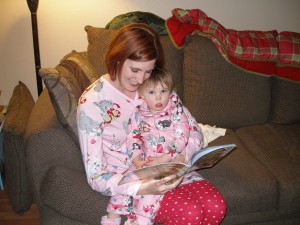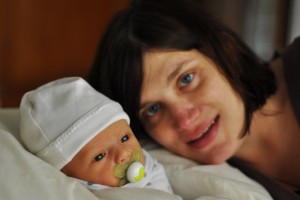How Personality Type Affects Your Mothering Style
Motherhood can be overwhelming and discouraging in many ways. We can be so consumed by our “mistakes” that we often lose sight of the things we are doing right with our children. As parents, I think it can be difficult to take a close look at our personal strengths and weaknesses; we are bombarded with choices from everything to our parenting philosophy (attachment, free-range, etc) to our schooling decisions (Montessori, public schools, homeschooling) to how we feed our baby (breastfeeding wars, anyone?). Sometimes we forget about the things we innately bring to the table as parents: our temperaments and our personalities.
I have found it to be both fascinating and helpful to identify some of my most prominent traits, both positive and negative, and apply them to how I function as a parent. For example, I would describe myself in general as sensitive, passionate, affectionate, emotional, communicative, and introspective.
On the positive side of the spectrum, these qualities make me a nurturing, affectionate, joyful, self-aware parent who is quite effective at emotional processing and imparting knowledge.
On the flip side, I am also moody, overreactive, overly sensitive, and selfish at times. This manifests by me losing my temper when I am frustrated, and becoming overstimulated by the chaos that occurs naturally with young children.
I thrive when it comes to hugging, snuggling, and rocking my children. I am quick to kiss boo-boos, sing songs to my children, read with them, and share the wonder of experiencing life together. It is easy for me to connect emotionally with my daughters.
 However, I often struggle with the more physical aspects of parenting: wiping bottoms, learning over to put a squirming child in her carseat, chasing an uncooperative child: the constant bending, bending, bending overwhelms me. I am also uncomfortable with imaginative play.
However, I often struggle with the more physical aspects of parenting: wiping bottoms, learning over to put a squirming child in her carseat, chasing an uncooperative child: the constant bending, bending, bending overwhelms me. I am also uncomfortable with imaginative play.
While reflecting on these observations is interesting, it didn’t really get me anywhere. Then I hit the jackpot. I found the book: MotherStyles: Using personality types to learn to parent from your strengths, by Janet P. Penley. This book employs a philosophy based on the Myers-Briggs Type Indicator personality inventory to help mothers understand how their personality type shapes their unique styles as parents. Penley writes,
“According to many psychologists, we are happiest and feel most fulfilled when we are using our strengths. Understanding your personality type can help you identify your natural strengths as well as your personal path to success in mothering and in life.”
Many of us are familiar with the Myers-Briggs assessment tool: There are 4 key areas that are determined, resulting in sixteen different categories:
- Extraversion or Introversion (E/I)– where do you focus your attention and get your energy?
- Sensing or Intuition (S/N)– what information do you attend to most?
- Thinking or Feeling (T/F) – how do you make judgments/decisions?
- Judging or Perceiving (J/P) – how do you like your outer world structured?
If you haven’t ever taken the Myers-Briggs assessment, I highly recommend it. It is a fascinating process, and although there are many different factors that contribute to person’s overall nature, understanding our personality types can inspire a great deal of self-awareness. Visit the Myers-Briggs website for more information. There are several quizzes online, including this one that describes how personality style affects your mothering style. The MotherStyles website has a very short quiz to assess your style, and provides some great insights.
I happen to be an ENFJ, which makes me extraverted, intuitive, feeling, and judging. Here is what MotherStyles has to say about my particular type as it pertains to mothering: ENFJ is the “Heart to Heart Mother.” Penley explains,” Expressive and warm, the ENFJ mother is adept at talking about personal concerns, both her children’s and her own.” Well, that pretty much hits the nail on the head!
She goes on to specify that these mothers are skilled at initiating heart-to-heart conversations with their children, providing an open forum for articulating feelings, and nurturing through affirmation, praise and encouragement. It was both comforting and validating to hear my positive qualities summarized so concisely, but is was equally helpful to read the struggles that mothers of this type encounter.
ENFJ moms often feel guilt when choosing between people and getting things done. They have difficulty backing off, and sometimes worry about being overbearing. ENFJ mothers may struggle with objectivity due to their own sensitivities to their children’s pain. Because she is emotionally expressive, she may fly off the handle. Suffice it to say, this assessment definitely resonated with me!
I found it extremely helpful that in addition to discussing the strengths and struggles of each type, Penley offers some tips in the chapter of each specific type. For example, she comments that humor can be helpful to balance the natural intensity of the ENFJ mom. She also noted that this personality type benefits from daily peace and quiet to re-energize. Take that, mommy guilt!
I also found it interesting to read about the personality types that are in direct contrast to mine. For example the ISTP type is known as the “Give ‘em Their Space” Mother, excelling at respecting a child’s privacy but struggling with providing emotional support. Definitely not my style. The ESTP mom is described by Penley as “active and spontaneous, the ESTP mother can turn ordinary life into a fun-filled adventure.” Hmm. Not so much.
Other types are summarized as “The Giving” Mother- ISFP– who is a people pleaser above all else; The “Totally There” Mother- ESFP– who likes to give her children an immediate response; The “Happy Together” Mother- ESFJ– who thrives on the whole family being happy together; The “Responsibility” Mother- ISFJ– who has a serious love affair with her to- do list.
Do you recognize yourself in any of these types? Keep in mind, there are 16 unique types, and many of us may recognize ourselves in several of them. Taking the Myers-Briggs personality inventory, or even the short quiz provided in the book, is a fantastic way to get a feel for where you may fall on the spectrum.
So what is the value of learning more about our personality types and mothering styles? When Janet Penely experienced her “aha” moment that began her journey to creating this book, she describes,
“I had to reclaim myself in my mothering. It was time to stop turning outward for answers and start tuning in to who I was as a person. Right or wrong, I had to muster the courage to raise my children in my own very personal and human way.”
She also mentions the fact that mothers are bombarded with information from well-meaning experts, instructing us with the supposed “right” way to parent. She asserts that moms need less advice and more support to find their own way, incorporating their own strengths and values. The Myers-Briggs assessment refers to our type “preferences” and “nonpreferences”, and Penley explains,
“Consistently overusing our nonpreferences makes mothering difficult and draining.”
One of my favorite sections of this book is the discussion on family dynamics; Penley breaks down how your type may interact with your spouse’s type, as well has how your type combines with those of your children. She discusses that mothers may connect more easily with one child, and clash with another, due to personality type differences. She also breaks down differences in preference between parents, and focuses in depth on how specific personality types interact within a marriage. I especially enjoyed the “My Husband Is My Opposite Type!” section.
I found this book to be engaging, (I couldn’t put it down!) intriguing, (being a person who enjoys analyzing myself and others) and practical (filled with helpful tips and insights to apply to family life). Penley shares that her hope for readers is that they will learn to trust their strengths, gain confidence, be more accepting of their struggles, understand differences and minimize conflict with a spouse or child who has a different type, and strengthen family relationships. You can buy the book on Amazon here or visit the MotherStyles website for more information.
So….what type are you?





















